Can ducks eat mealworms? The answer is yes! Ducks can eat mealworms. Mealworms are a great source of protein for ducks.
Ducks typically eat insects, small frogs, and fish in the wild. So, if you find that your duck is snacking on a few mealworms here and there, don’t be alarmed. It’s perfectly normal behavior.
Mealworms are also a great way to supplement your duck’s diet. If you are looking for a high-protein treat to give your ducks, mealworms are an excellent option. Just be sure not to overdo it, as too many mealworms can lead to health problems for your ducks.
This article will help you understand more about feeding mealworms to your ducks and what to watch out for.
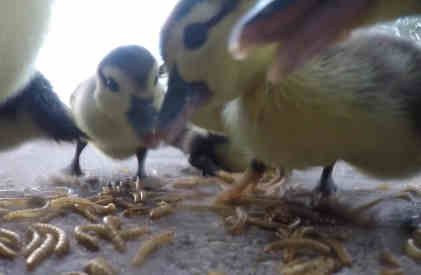
What are mealworms?
Mealworms are the larvae of the darkling beetle. They are a common food source for reptiles, amphibians, birds, and mammals.
Unlike other types of insects, mealworms can be easy to care for and don’t require a lot of space. This makes them a popular food source for people who keep pet ducks.
[DuckAffiliate]
Can ducks eat mealworms?
Mealworms are high in protein and fat, which makes them a good source of energy for ducks. However, they should not be the only food that ducks eat. A diet that consists mostly or entirely of mealworms can lead to health problems such as vitamin A deficiency and obesity.
For this reason, it’s important to feed ducks a variety of foods so that they get all the nutrients they need. In addition to mealworms, ducks can eat fruits, vegetables, grains, and insects.
Read More: Do Ducks Eat Frogs? Simple Answer & Health Benefits
The benefits of eating mealworms for ducks
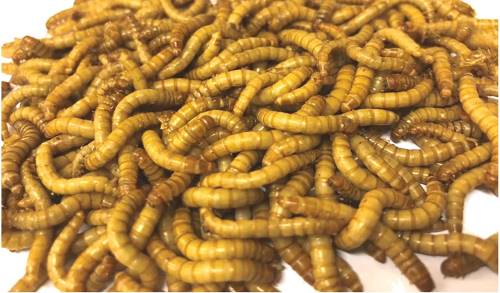
Mealworms are an excellent source of nutrition for ducks. Here are a few reasons to consider adding mealworms to your ducks’ diet.
Excellent source of protein
Ducklings need a high-protein diet to support their rapid growth, and mealworms are an excellent source of protein. One hundred grams of dried mealworms contain approximately 50 grams of protein. That’s more than twice the amount of protein found in an equivalent amount of chicken breast.
Rich in essential nutrients
Mealworms are also a good source of essential fatty acids, vitamins, and minerals. Essential fatty acids are important for ducklings’ brain development, while vitamins and minerals help support their immune system and overall health.
Better digestion
Because mealworms are easier to digest than pellets or grain, feeding them to your ducks can help improve digestion and prevent digestive issues like diarrhea.
A natural diet
As we mentioned before, ducks in the wild eat mostly insects. So, by feeding your ducks mealworms, you are giving them a more natural diet closer to what they would eat in the wild.
Can help reduce aggression
Males ducks can be especially aggressive during mating season, but did you know that feeding them mealworms can help reduce their aggression? That’s because the extra protein and nutrients in mealworms help reduce stress levels and improve ducks’ overall health, leading to fewer instances of aggression.
An eco-friendly duck food option
If you’re looking for an eco-friendly way to feed your ducks, look no further than mealworms! Unlike other animal-based proteins like chicken or beef, mealworms require very little land and water to produce. You can even feed mealworms on food waste like vegetable scraps.
Read More: Can Ducks Eat Eggs? 3 Surprising Benefits
Things to watch out for when feeding mealworms to ducks
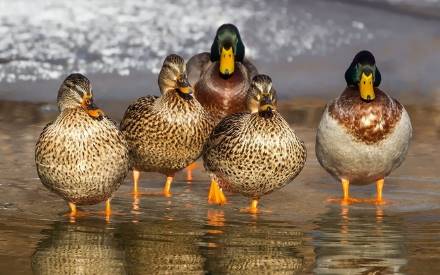
While mealworms can be a healthy treat for ducks, there are a few things you need to watch out for. Now we’ll discuss 4 potential dangers of feeding mealworms to ducks.
Pesticides and herbicides
Mealworms are often raised on commercial farms where they are fed a diet of grains and vegetables. These crops are often sprayed with pesticides and herbicides, contaminating the mealworms.
These chemicals can harm ducks, so purchasing mealworms that have been raised organically is important.
Mold and fungi
Mealworms are also susceptible to mold and fungi contamination. These contaminants can cause digestive issues in ducks, so it’s important to inspect your mealworms before feeding them to your duck. If you see any mold or fungus, discard the worm immediately.
Salmonella
Mealworms can also carry salmonella, a bacteria that can cause food poisoning in ducks (and humans). To avoid this, wash your hands thoroughly after handling mealworms and refrain from letting your duck eat straight from the container.
It’s also a good idea to cook the worms before feeding them to your duck; this will kill any bacteria that may be present.
Parasites
Another thing to watch out for when feeding mealworms to ducks is parasites. These tiny creatures can attach themselves to the mealworms and infect your duck when they consume the worm.
To avoid this, purchase your mealworms from a reputable source and inspect them carefully before feeding them to your duck. If you see any worms that look strange or have any growth on them, throw them away.
Read More: Can Ducks Eat Fish? 5 Fantastic Benefits
How often should ducks eat mealworms?
Mealworms are high in protein and fat, which makes them a good source of energy for ducks. They are also a good source of vitamins and minerals, including phosphorus, iron, and magnesium.
For these reasons, mealworms should be included as part of a healthy diet for ducks. But how often should ducks eat mealworms?
Ducks in the wild typically eat small insects, such as mosquitoes, moths, and gnats. They will also eat beetles, crickets, and caterpillars. In captivity, however, ducks may not have access to these types of insects. As a result, they will need to be given a diet that includes other protein sources, such as mealworms.
While there is no one-size-fits-all answer to this question, as it will depend on the age and size of the duck as well as the other foods they are eating, a general guideline is to give ducks around 2-3 tablespoons of mealworms per day.
How to prepare mealworms for feeding to ducks
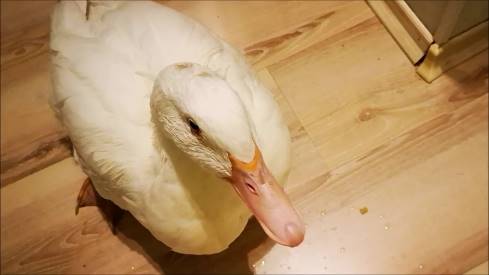
Here is a quick guide on preparing mealworms for feeding your ducks.
- Purchase mealworms from your local pet store or online. You can also find them in the wild, but this is not recommended as you don’t know what kind of environment they’ve been living in.
- Rinse the mealworms off with cold water to remove any dirt or debris that may be on them.
- Place the mealworms in a container with fresh vegetables like lettuce or carrots, so they have something to eat while you’re preparing them.
- Boil a pot of water and then pour it over the mealworms. This will kill any bacteria or parasites that may be on them.
- Allow the mealworms to cool before feeding them to your ducks. You can chop them up into smaller pieces or leave them whole, depending on the size of your duck’s mouth.
By following these simple steps, you can ensure that your ducks are getting the best possible meal and that they are safe from harmful bacteria or parasites.
Can baby ducklings eat mealworms?
The answer is yes – ducklings can safely eat mealworms. Mealworms can be a healthy and nutritious treat for your ducklings.
Mealworms are high in protein and fat, essential nutrients for growing ducklings. In addition, mealworms are a good source of vitamins and minerals, including iron, copper, and zinc.
Including mealworms in your duckling’s diet will help them grow strong and healthy.
You can purchase mealworms online or at your local pet store. Once you have your mealworms, you’ll need to prepare them by following the above instructions. Start by offering a small number of mealworms and increase the quantity as required based on your duckling’s appetite.
What other insects can ducks eat?
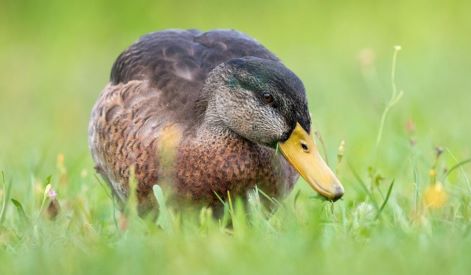
If you own ducks, you know they love to eat insects. Ducks are one of the few animals that will seek out insects to eat. This is because insects are a great source of protein for ducks. But what other insects can ducks eat? Let’s take a look.
In addition to mealworms, ducks can also eat:
- Crickets
- Grasshoppers
- Beetles
- Fly larvae
- Moth larvae
- Ants
- Termites
- Waxworms
- Caterpillars
As you can see, there are many different types of insects that ducks can eat. And luckily for us, most of these insects are relatively easy to find.
If you live in an area with a lot of trees and vegetation, there are plenty of insects for your duck to eat. Just let them outside, and they’ll take care of the rest!
How to give ducks a healthy and balanced diet
Many people don’t realize that ducks require a specialized diet to stay healthy. Here we’ll go over what ducks need to eat to stay healthy and happy.
A healthy diet for a pet duck generally consists of three main components: hay, pellets, and vegetables. Ducks should have hay available at all times to help with their digestion. They also need duck-specific pellet food that you can get from most pet stores.
What do ducks like to eat?
Ducks are omnivorous, which means they enjoy eating plant- and animal-based foods. Some of the things that ducks like to eat include:
- leafy greens such as lettuce and kale
- seeds and grains such as oats and wheat
- insects such as beetles, grubs, and flies
- fish
- insects
You can either buy duck food from a pet store or create your own duck diet by giving them a mix of the foods listed above.
It is important to note that ducks should not eat avocados, chocolate, or processed food, as these can harm their health.
How often should I feed my duck?
The amount of food you give your duck will depend on its age, size, and activity level. As a general rule of thumb, you should feed your duck twice daily – once in the morning and once at night.
The amount of food you give them each time will also depend on these factors. For example, if you have a young duckling, you will need to provide them with more food than an adult duck. It is best to consult your veterinarian about how much food your specific duck needs to grow healthy and strong.
What other nutrients do ducks need?
Besides food, ducks also need water to stay hydrated. It is important to have a clean water source available for them at all times.
Additionally, ducks also need access to grit, which helps them grind up their food in their gizzards. You can purchase grit at most pet stores or online retailers specializing in pet supplies.
Finally, ducks enjoy dirt baths to keep their feathers clean and healthy.
Can ducks eat mealworms – final thoughts
So there you have it. Ducks can eat mealworms – they’re an excellent food source.
While ducks can certainly eat mealworms, it’s important to ensure they are part of a well-rounded diet. A diet that consists mostly or entirely of mealworms can lead to health problems such as vitamin A deficiency and obesity.
For this reason, it’s important to feed ducks a variety of foods so that they get all the nutrients they need. In addition to mealworms, ducks can eat fruits, vegetables, grains, and insects.
Related Articles:
